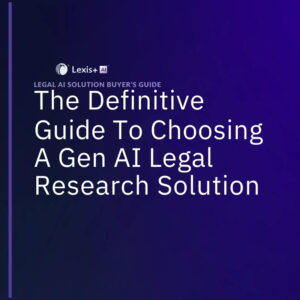In
a
significant
ruling
for
legal
publishing
and
AI
development,
a
federal
judge
has
granted
partial
summary
judgment
to
Thomson
Reuters
in
its
long-running
copyright
infringement
lawsuit
against
ROSS
Intelligence,
finding
that
ROSS
infringed
on
Westlaw’s
copyrighted
headnotes
and
rejecting
ROSS’s
fair
use
defense.
The
ruling,
issued
today
by
3rd
U.S.
Circuit
Court
of
Appeals Judge
Stephanos
Bibas,
sitting
by
designation
in
the
U.S.
District
Court
in
Delaware,
found
that
ROSS
infringed
Thomson
Reuters’
copyrights
in
2,243
Westlaw
headnotes
when
it
used
them
to
train
its
AI-powered
legal
research
platform.
The
court
specifically
rejected
ROSS’s
argument
that
its
use
of
the
headnotes
constituted
fair
use
under
copyright
law.
Read
the
full
memorandum
opinion.
“Ross
was
using
Thomson
Reuters’s
headnotes
as
AI
data
to
create
a
legal
research
tool
to
compete
with
Westlaw,”
Judge
Bibas
wrote.
The
decision
revises
Judge
Bibas’s
2023
summary
judgment
opinion
in
the
case,
which
had
largely
denied
Thomson
Reuters’s
motions.
In
explaining
his
change
of
position,
Judge
Bibas
opened
his
opinion
with
a
stark
admission:
“A
smart
man
knows
when
he
is
right;
a
wise
man
knows
when
he
is
wrong.
Wisdom
does
not
always
find
me,
so
I
try
to
embrace
it
when
it
does
—
even
if
it
comes
late,
as
it
did
here.”
See
all
stories
about
this
lawsuit.
While
the
ruling
is
significant,
it
does
not
yet
put
this
case
to
rest.
Multiple
issues
remain
to
be
decided
at
trial,
including
whether
some
of
Thomson
Reuters’s
copyrights
have
expired
or
were
untimely
created,
and
whether
ROSS
in
fact
copied
Westlaw’s
Key
Number
System,
as
Thomson
Reuters
alleges.
Focus
on
Fair
Use
The
ruling
focused
heavily
on
the
fair
use
analysis,
examining
the
four
statutory
factors.
While
two
of
the
factors
favored
ROSS,
the
court
found,
the
two
most
important
factors
–
the
purpose
and
character
of
the
use
and
the
effect
on
the
potential
market
–
favored
Thomson
Reuters.
The
judge
specifically
distinguished
this
case
from
the
Supreme
Court’s
Google
v.
Oracle
decision,
noting
that
unlike
the
API
at
issue
in
that
case,
“There
is
nothing
that
Thomson
Reuters
created
that
Ross
could
not
have
created
for
itself
or
hired
LegalEase
to
create
for
it
without
infringing
Thomson
Reuters’s
copyrights.”
The
judge
also
found
that
Westlaw’s
headnotes
met
the
threshold
for
originality
required
for
copyright
protection,
contrary
to
his
prior
opinion
where
he
said
that
was
a
factual
question
for
a
jury
to
decide.
“[A]
headnote
can
introduce
creativity
by
distilling,
synthesizing,
or
explaining
part
of
an
opinion,
and
thus
be
copyrightable,”
he
wrote.
“That
is
why
I
have
changed
my
mind.”
The
court
also
rejected
all
of
ROSS’s
other
defenses,
including
innocent
infringement,
copyright
misuse,
merger,
and
scenes
à
faire.
However,
Judge
Bibas
left
one
significant
copyright
issue
for
trial:
whether
some
of
the
copyrights
at
issue
have
expired
or
were
untimely
created.
Long-Running
Litigation
The
case
began
in
2020
when
Thomson
Reuters
sued
ROSS,
alleging
that
it
had
copied
Westlaw
content
to
train
its
competing
AI
legal
research
platform.
According
to
the
complaint,
after
Thomson
Reuters
refused
to
license
its
content
to
ROSS,
ROSS
contracted
with
legal
research
company
LegalEase
to
obtain
the
content
indirectly
through
bulk
memos
that
were
created
using
Westlaw
headnotes.
The
case
had
been
scheduled
to
go
to
trial
last
August,
but
was
mysteriously
continued
on
the
eve
of
starting.
In
the
opinion
issued
today,
Judge
Bibas
explained
that,
as
he
studied
the
case
materials
in
more
depth
in
the
run-up
to
the
trial,
he
“realized
that
my
prior
summary-judgment
ruling
had
not
gone
far
enough.”
He
thus
ordered
the
continuance
and
invited
the
parties
to
renew
their
summary
judgment
briefing.
While
this
ruling
resolves
key
aspects
of
the
case,
several
issues
remain
for
trial.
In
addition
to
the
copyright
issue
mentioned
above,
Judge
Bibas’s
prior
opinion
had
left
several
issues
for
trial.
These
include
factual
questions
of
whether
ROSS
copied
the
Key
Number
System
and
certain
court
opinions
containing
Thomson
Reuters’s
editorial
decisions,
and
various
questions
about
contributory
liability,
vicarious
liability,
and
tortious
interference
with
contract.
“I
leave
undisturbed
the
parts
of
my
prior
opinion
not
addressed
in
this
one,
such
as
my
rulings
on
contributory
liability,
vicarious
liability,
and
tortious
interference
with
contract,”
he
wrote
today.
ROSS
ceased
operations
in
January
2021,
citing
the
cost
of
defending
this
litigation,
but
the
case
has
continued
as
Thomson
Reuters
seeks
damages
for
the
alleged
infringement.
The
ruling
could
have
significant
implications
for
AI
companies
—
and
particularly
legal
AI
companies
—
that
seek
to
train
their
systems
using
copyrighted
materials,
particularly
in
cases
where
the
AI
product
would
compete
directly
with
the
copyright
holder’s
business.






 Kathryn
Kathryn















